|
  |
|




1940s DICKERSON AMP REBORN!
(click on any photo for
A larger picture)
|

Picked up a nice little Mother of Pearl (a.k.a. MOTS) Dickerson amp on eBay.
These amps were produced in the early 1940s and used with lap steel guitars.
Poor little thing had a shorted transformer and corroded wires, as well as a few
non-original parts.
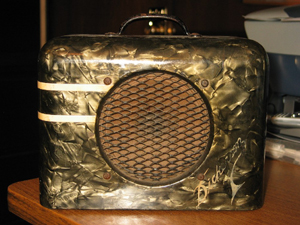
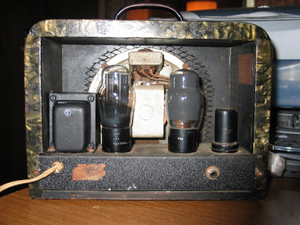
This amp uses a 6SF5 preamp, 6F6 power tube,
and a 5Y3G rectifier. Check out those beautiful coke bottle shaped tubes.

WHAT IS THAT AWFUL SMELL?!!!
HEAVILY ROTTED CLOTH
WIRING AND A SHORTED TRANSFORMER Looking inside, we
found the cloth wires rotted significantly. These had in turn shorted the transformer.
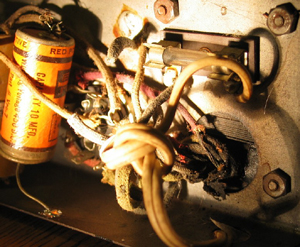

TRANSFORMER WIRES REPAIRED AND CONNECTED
FOR TESTING.
IT WORKS...FOR A FEW MINUTES!
|
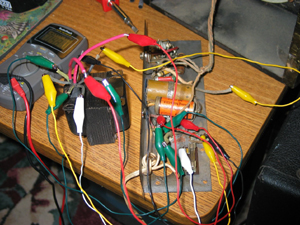 I
disassembled and cleaned the transformer, then added spliced wires
with shrink tubing insulation. After connecting things with clips,
everything worked well. So I reassembled the whole thing. For a few
brief minutes we had sweet tone from Strat to Dickerson.
Unfortunately, the transformer gave up the ghost "shortly"
thereafter, proving that electronics run on smoke (let the smoke
out, the electronics no longer work). I
disassembled and cleaned the transformer, then added spliced wires
with shrink tubing insulation. After connecting things with clips,
everything worked well. So I reassembled the whole thing. For a few
brief minutes we had sweet tone from Strat to Dickerson.
Unfortunately, the transformer gave up the ghost "shortly"
thereafter, proving that electronics run on smoke (let the smoke
out, the electronics no longer work).
Drastic measures were in
order to save the little jewel. |
 |
|
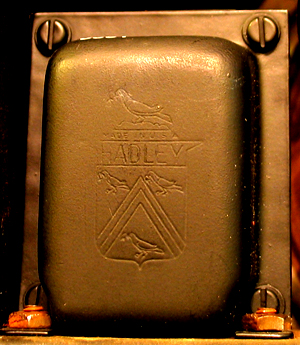 A
bit of research showed that the transformer was a 1941 Hadley.
Surprisingly, the Robert M. Hadley Company (www.rmhco.com)
is still in business today! A
bit of research showed that the transformer was a 1941 Hadley.
Surprisingly, the Robert M. Hadley Company (www.rmhco.com)
is still in business today!
Hadley builds transformers for a wide
variety of customers, from US Government contractors to providers of
ultra-high end amplifiers. Seriously, one of the applications is an
$85,000 Stereo 304TL Amplifier (you can buy JUST the transformers for
$20,300).
I called Jim Hadley, President of
Robert M. Hadley, and he said they could rebuild my transformer. He
searched their archives and found the original drawings, dated April 26, 1941
(Click
here for a scan of the original specs.).
A custom rewind for a lot size of one?
I call that the ultimate in customer service. It wasn't free, but you can
bet it cost a LOT more to rewind this transformer than I had to pay. |

ALIENS IN THE HOUSE
|
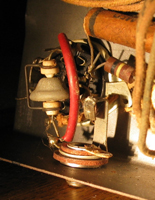 While
waiting for the transformer rebuild, I went to work sonically
restoring the amp. The first step was to identify the
flying-saucer-shaped component on the preamp tube. I posted some
pics to a few google groups and was rewarded with a speedy
identification (thanks to the smart folks on
rec.antiques.radio+phono for their help). While
waiting for the transformer rebuild, I went to work sonically
restoring the amp. The first step was to identify the
flying-saucer-shaped component on the preamp tube. I posted some
pics to a few google groups and was rewarded with a speedy
identification (thanks to the smart folks on
rec.antiques.radio+phono for their help).
The component was a rare battery bias cell used to apply a negative
bias to the 6SF5 preamp tube.
|
 |
|
The bias cell initially read zero volts. Over time the electrolyte
dries out, which kills the cell. I read about several methods used
to rejuvenate these cells, most of which involved
drilling tiny holes in the membrane and injecting water (www.philcorepairbench.com/biascell.htm).
 Instead
of drilling, I dropped mine in a cup of boiling water. Instantly we saw
tiny air bubbles streaming out of the cell as the heat expanded the
air inside. As the water cooled, the thirsty cell sucked some water in
(nature abhors a vacuum). I dried the cell and resealed the leaky
seam with crazy glue. It has read 1.24 volts ever since. Instead
of drilling, I dropped mine in a cup of boiling water. Instantly we saw
tiny air bubbles streaming out of the cell as the heat expanded the
air inside. As the water cooled, the thirsty cell sucked some water in
(nature abhors a vacuum). I dried the cell and resealed the leaky
seam with crazy glue. It has read 1.24 volts ever since.
In the example
diagram on the left, the bias cell is shown between the Grid and
ground. On my amp, the cell is placed in series with the input jack,
a common alternative in the 30s and early 40s. Someone had modified
the amp after the cell died by bypassing the bias cell with a red
wire (see photo above right). After rejuvenating the bias cell, I
removed the red wire to restore the bias to its original state. |

TO CAP THINGS OFF...
|
|
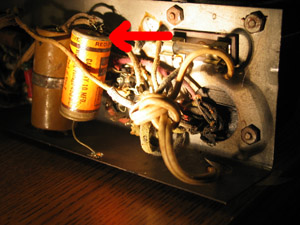 Something
else that wasn't original was the Illinois Capacitor Company 10 MFD
cap. Originally the amp had only a single body, double 8 MFD electrolytic filter cap. Evidently one side of this cap went bad, thus the
"new" (now about 40 year-old) Illinois cap was added. Something
else that wasn't original was the Illinois Capacitor Company 10 MFD
cap. Originally the amp had only a single body, double 8 MFD electrolytic filter cap. Evidently one side of this cap went bad, thus the
"new" (now about 40 year-old) Illinois cap was added.
Instead of replacing
the double cap, I removed it as well as the Illinois Cap and put them in
a safe place. I substituted two Sprague 20 MFD caps for the double 8 MFD. I also
replaced the 0.01 MFD electrolytic coupling cap between the first and
second stages, again keeping the old cap in a safe place. If I ever wanted
to sell this amp, which is doubtful, it can easily be restored to stock.
In the mean time, the new caps make it sound incredible. |

 |

UP AND RUNNING |
 |
|
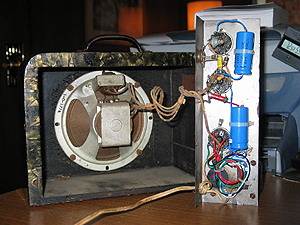 Here
is a shot of the inside of the amp after the rebuild. The new transformer
is installed, as are the three replacement caps (two blue Spragues and a
tiny yellow Mallory 150). Here
is a shot of the inside of the amp after the rebuild. The new transformer
is installed, as are the three replacement caps (two blue Spragues and a
tiny yellow Mallory 150). |
 |
|
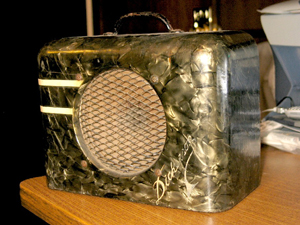 This
little
amp sounds very sweet. It's volume is perfect for a desktop practice amp;
I would guess about 1 watt. It won't
distort without a pedal or box in front, but has its own unique compression and excellent reaction
to pick attack. This
little
amp sounds very sweet. It's volume is perfect for a desktop practice amp;
I would guess about 1 watt. It won't
distort without a pedal or box in front, but has its own unique compression and excellent reaction
to pick attack.
I'll record a few
cuts and post here in the not-too-distant future. Thanks for
reading. If you want to talk about amplifiers, use my "contact us" link at
the top of this page.
 Clip
One (more to come): Clip
One (more to come):
Name: "Brenda's
Song"
Author: Mick
Format: Wave (about 3 megs)
Recorded from Tele to Dickerson to computer headset mike!
|
|
|

Go Back to Amps Page

 |
|
MICK HARD AT WORK ON QUALITY
CONTROL
 |


 |
<META name="description" content="Online guide to
Charleston, Mount Pleasant, Kiawah, Folly Beach and Hilton Head, South Carolina,
beaches, hotels, vacations, accommodations, and restaurants">
<META name="keywords" content="charleston spoleto festival dining cuisine
restaurants eating food south carolina Charleston,Mount Pleasant,Dunes
West,Summerville,Wild Dunes,Goose Creek,North Charleston,Charleston
History,Historical Charleston,South Carolina,south
carolina,sc,SC,beaches,golf,golf
courses,tennis,accommodations,tourism,travel,inns,bed and
breakfast,vacations,entertainment,Charleston entertainment,tourism,Charleston
restaurants, restaurants,hotels,Charleston hotels,Charleston motels,Charleston
bed and breakfast,tours,Charleston tours,Charleston
Tours,events,Events,art,arts,music,Music,Charleston nightclubs,charleston
nightclubs,Charleston nightclubs,historic homes,Charleston historic homes">
stats
